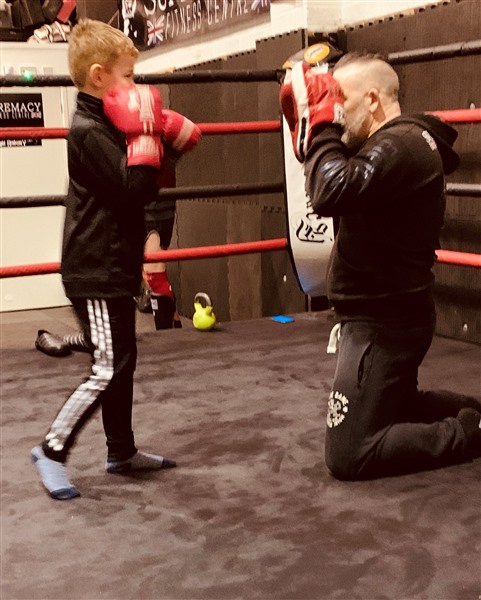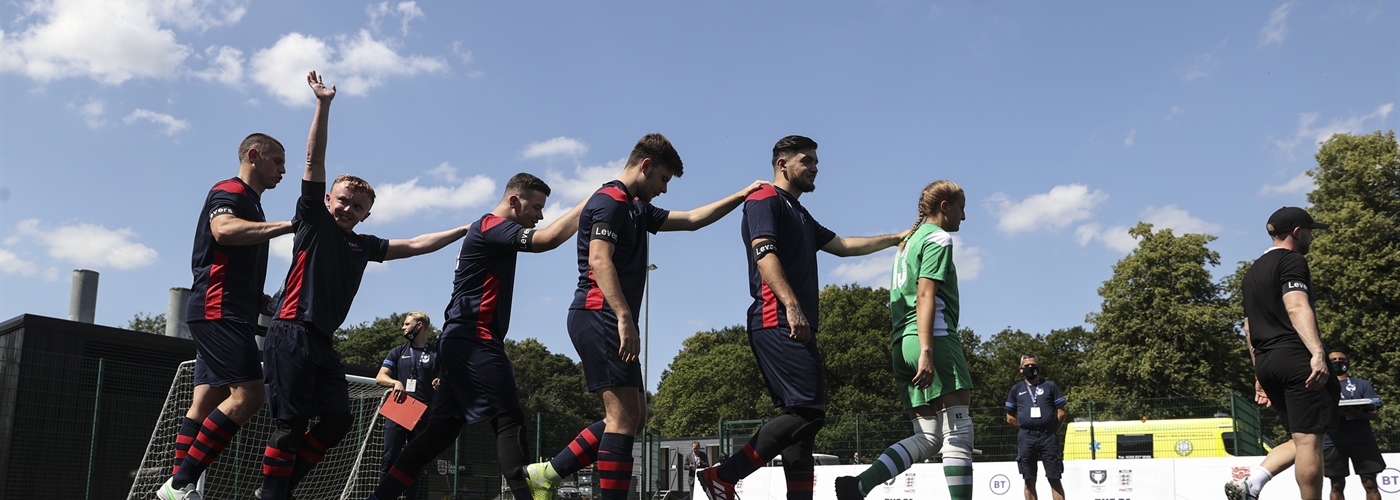In this blog, Wendy Booth, National development manager (programmes) for The FA, shares her journey within disability football.
I have been involved in football for as long as I can remember, playing, coaching and managing with even a spot of refereeing thrown in for good measure. It’s been a fantastic ride! I sometimes pinch myself when I look at where I am now - working full time, in the game I love, helping ensure football is accessible to everyone.
I didn’t intentionally become a disability football specialist, in fact when I secured my first role in disability football, I didn’t even know it existed before I saw the advert!
I had spent some time in the USA coaching the game before returning to England to gain further qualifications to progress as a coach. On my return, I secured a job with a local charity, called Playability, who provide play opportunities for children with severe and profound learning difficulties. And so, my journey began!
Part of my role was to meet the child and their family, in their own home, before they attended any play sessions to help understand their needs. I will never forget my first visit to a young boy, aged five, with severe Cerebral Palsy and no verbal communication. I won’t lie I was a little bit nervous and out of my comfort zone attending that first visit, what should I do, what should I say!
It turned out I had nothing to worry about, the family were so welcoming and the little boy had nothing but smiles and giggles for me. There was a lot to learn about him to ensure our play opportunities were suitable and we could communicate, but that is what we were there for to ask questions and understand his needs. After that visit I was hooked on ensuring disabled young people got the opportunity to play with their peers outside of school just as any other child would.
Fast forward four enjoyable rewarding years, and the birth of my first child Leo, when I saw a job opportunity with Cheshire Football Association for a disability football development officer. A perfect job to combine my two passions of football and enabling opportunities for disabled people!
Here is a video to show some of the work we did:
I spent the next five years having the pleasure of developing disability football across the county for males and females of all ages. This included supporting the creation of new teams and leagues as well as recreational opportunities with organisations you may not associate with football, such as local daycare centres for adults with learning disabilities, learning so much about this area of the game along the way.
My ambition became to work for The FA and help impact disability football on a wider scale using my knowledge and experience to help support developments across the whole of the country. I am now thrilled to be working for The FA helping adapt grassroots participation programmes to ensure they are inclusive and engage new disabled players. One of the most recent developments I have been involved in is the adaption of our Weetabix Wildcats programme where I have influenced the introduction of an alternative equipment package, new training module as well as behaviour/communication strategies.
At this point, I would like to tell you a little more about Leo because, whilst all this was happening in my career, in my personal life I noticed that he was struggling with social communication as well as his emotions, which were always intense and heightened.
You may wonder why I am sharing this with you. Well I am sharing this part of my life as I have seen how new experiences and environments can impact Leo’s behaviours, and it may be that you come across a child who has similar hidden social and emotional challenges that they need to overcome in order to enjoy your sessions.
I think back to one experience when we booked Leo into a 1:1 class with a kickboxing instructor. Leo was really keen and happy to attend until we got there, opened the door and the experience didn’t look, sound or feel like he expected. Leo exploded into a rage and said he did not want to go in or do the class, displaying really extreme and inappropriate behaviours. His dad and sister went into the class whilst I tried to calm him down and convince him to go in, after a while, he agreed to join in and engaged in some of the session.
On the way home I said to him ‘Next week’, before I could finish the sentence he said ‘I am not going back again next week!’.
The following week we took him back again and he stood outside the class screaming ‘I am not going inside until my lesson is over!’ Again, his dad and sister went in whilst I battled to get Leo inside. At this point, I wasn’t sure if I was doing the right thing by him, but I thought if I take him home then anything he finds overwhelming he may think he doesn’t have to overcome and can instead just walk away. So I continued to coax him into the session as he fought to avoid the situation. When I finally got him inside he was rude to the instructor and still refused to join in. At this point, I’m sure you’re thinking, just take him home he obviously doesn’t want to be there! However, as Leo finally calmed and watched a little of the session he agreed to join in again.
Then what happened a couple of days later left me flabbergasted! On the way to school he said to me, ‘Mummy do you know what my two favourite days of the week are? Tuesday because we get to play on the big pitch at school and Sunday because I go to kickboxing!’ I just couldn’t believe what he said after the struggle we had just a couple of days earlier! He has enthusiastically attended his kickboxing class every week, building a wonderful relationship with his coach and developing some impressive skills.

The reason I decided to share this personal experience is to help you to understand that the behaviours players are displaying may not be down to bad behaviour or because they don’t want to be there. It may be because they are overwhelmed or overstimulated by the situation or environment and unable to communicate how they are feeling.
We have learned to put better strategies in place for Leo, such as taking him to the venue or showing him pictures in advance of the session so he is familiar, introducing him to the person who will be leading the session and allowing him to go along and watch first. There have been times when he has sat on the side for the first 50 minutes and joined in for the last ten, but it has been part of his journey to feeling secure and comfortable.
There are many children with hidden disabilities/difficulties, such as ADHD, Aspergers and Autism who wish to, and should have the opportunity to, engage in football. So if you have a child at a session who is displaying unexpected behaviours then it may be that you need to find out more about their needs, and understand it may take a number of weeks for them to settle and feel comfortable. Every child is different and it is so important we give everyone the opportunity to enjoy the wonderful game of football that we are all so lucky to be part of! And sometimes that means taking yourself out of your comfort zone, going that extra mile, having that little bit of extra patience, or doing things a little differently.
If you have had similar experiences, have any questions or would like to know more please comment below.



-

Lee Cooper
-
Cancel
-
Vote Up
0
Vote Down
-
-
Sign in to reply
-
More
-
Cancel
Comment-

Lee Cooper
-
Cancel
-
Vote Up
0
Vote Down
-
-
Sign in to reply
-
More
-
Cancel
Children